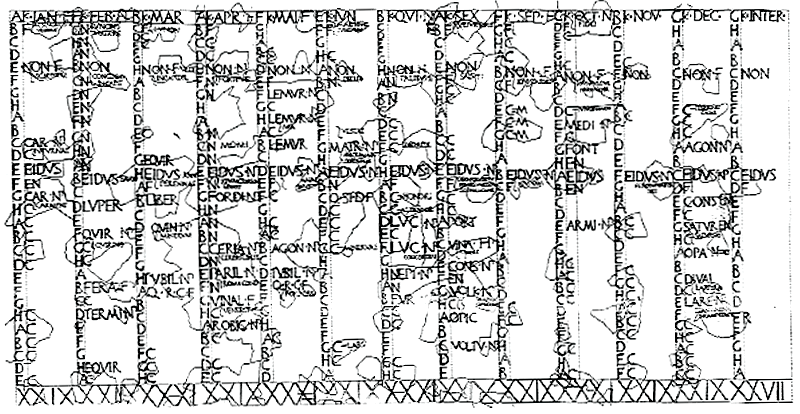Numa’s calendar is compared to others, and his benevolent influence is felt in and around Rome:
It is also said that January and February were added by Numa to the other months, who set out that the year should be reckoned as twelve months in accordance with the course of the moon. The calendar year had among the Romans previously been ten months, just as among some of the barbarians it was three months, and of the Greeks it was four months with the Arcadians, six months with the Acharnians. The calendar year was one month among the Egyptians, and subsequently four months. For that reason, the Egyptians seem wonderously ancient (though they are not), because they bring a preposterous weight of years into their genealogy when they match the number of years to the number of months. Numa also gave January its place at the beginning of the year.
Thus, as Numa accustomed his subjects to justice and piety, he removed all considerations of war. For, not only was the Roman people made tame by Numa’s sense of divine order and gentle disposition, but the beginnings of change overtook even the surrounding cities as they were all seized by desire for peace and justice, and a zeal for planting crops, raising children in peace, and reverencing the gods. No war, no uprising, no revolution in the city is recorded during Numa’s reign, nor is it recorded that any hatred, any envy, or any conspiracy was contrived against Numa through desire to seize the throne. Numa had a daughter named Pompilia, and he gave her in marriage to Marcius. From Pompilia was born Numa’s grandson Ancus Marcius, who reigned after Tullus Hostilius. When Ancus was five, Numa left him behind as he died, having been worn down by old age and a mild illness. He had lived for 83 years, and ruled for 43.

Λέγεται δὲ καὶ τὸν ᾿Ιανουάριον καὶ τὸν Φεβρουάριον παρ’ αὐτοῦ τοῖς μησὶ προστεθῆναι, δωδεκάμηνον κατὰ τὸν τῆς σελήνης δρόμον νομοθετήσαντος λογίζεσθαι τὸν ἐνιαυτόν, δεκάμηνον πρόσθεν ὄντα, ὡς ἐνίοις τῶν βαρβάρων τρίμηνον, καὶ τῶν ῾Ελλήνων ᾿Αρκάσι μὲν τετράμηνον, τοῖς δὲ ᾿Ακαρνᾶσιν ἑξάμηνον. Αἰγυπτίοις δὲ μηνιαῖος ἦν ὁ ἐνιαυτός, εἶτα τετράμηνος· διὸ καὶ ἀρχαιότατοι δοκοῦσιν εἶναι, καίτοι μὴ ὄντες, πλῆθος ἀμήχανον ἐτῶν ἐπὶ ταῖς γενεαλογίαις εἰσάγοντες, ἅτε δὴ τοὺς μῆνας εἰς ἐτῶν τιθέμενοι ἀριθμόν. καὶ τὸν ᾿Ιανουάριον δὲ Νόμας εἰς ἀρχὴν τοῦ ἔτους ἀπένειμεν. Οὕτω δὲ δικαιοσύνῃ καὶ εὐσεβείᾳ συνεθίσαντος τὸ ὑπήκοον, ἐξῄρητο πάντῃ τὰ τοῦ πολέμου. οὐ γὰρ μόνον ὁ ῾Ρωμαίων δῆμος ἡμέρωτο τῇ τοῦ βασιλέως εὐνομίᾳ καὶ πρᾳότητι, ἀλλὰ καὶ τὰς κύκλῳ πόλεις ἀρχὴ μεταβολῆς ἔλαβε, καὶ πόθος εἰσερρύη πάντας εἰρήνης καὶ τοῦ δικαίου, γῆν φυτεύειν καὶ τέκνα τρέφειν ἐν ἡσυχίᾳ καὶ σέβεσθαι θεούς. οὔτε γὰρ πόλεμος οὔτε στάσις οὔτε νεωτερισμὸς περὶ πολιτείας ἱστόρηται Νόμα βασιλεύοντος, οὐδ’ ἐπ’ ἐκεῖνον ἔχθρα τις ἢ φθόνος ἢ σύστασις ἀνδρῶν καὶ ἐπιβουλὴ δι’ ἔρωτα βασιλείας γενέσθαι ποι ἀναγέγραπται. θυγατέρα δ’ ἐσχηκὼς Πομπιλίαν, Μαρκίῳ ταύτην ἐξέδοτο· ἐξ ἧς Μάρκιος ῎Αγκος θυγατριδοῦς ἐτέχθη αὐτῷ, ὃς μετὰ Τοῦλλον ῾Οστίλλιον ἐβασίλευσε. τοῦτον πενταετῆ καταλιπὼν ὁ Νόμας ἐτελεύτησεν, κατὰ μικρὸν ὑπὸ γήρως καὶ νόσου μαλακῆς ἀπομαραινόμενος, χρόνον τριετῆ τοῖς ὀγδοήκοντα προσβιώσας,
βασιλεύσας ἔτη ἐπὶ τρισὶ τεσσαράκοντα.

